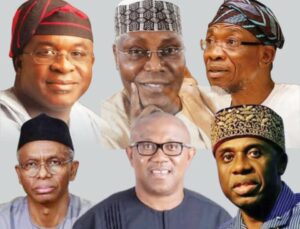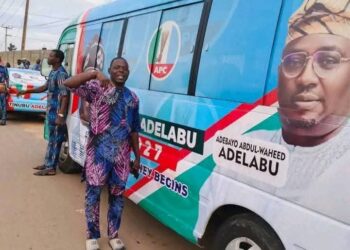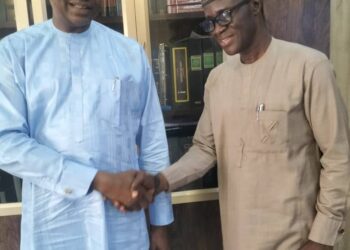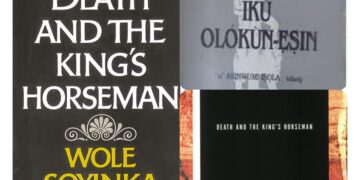Atiku, Obi, El-Rufai, Aregbesola, Amaechi and other political big names stake their reputations — and the ADC’s future — in 12-state bye-elections that could turn them into kingmakers or political casualties.

By Ibrahim Kegbegbe
Nigeria will tomorrow, Saturday, August 16, 2025, witness a politically charged set of bye-elections and court-ordered reruns across 16 constituencies in 12 states, in what analysts are already describing as “a mini general election with maximum consequences.”
The Independent National Electoral Commission (INEC) has confirmed that voting will take place for two senatorial seats, five House of Representatives seats, and nine state assembly seats in Edo, Anambra, Jigawa, Kaduna, Ogun, Oyo, Adamawa, Kano, Kogi, Niger, Taraba, and Zamfara States.
While bye-elections are often dismissed as local contests, tomorrow’s vote carries a unique national dimension — it will serve as the first electoral litmus test for the African Democratic Congress (ADC) since it became the surprise political refuge of several high-profile defectors from across Nigeria’s political spectrum.
Political Gladiators in a New Arena
In recent months, the ADC has transformed from a fringe party into an unlikely magnet for political heavyweights. Former Vice President Atiku Abubakar, ex-Kaduna State governor Nasir El-Rufai, Labour Party’s 2023 presidential candidate Peter Obi, former Interior Minister Rauf Aregbesola, former Governor of River State Chibuike Rotimi Amaech, and ex-Sports Minister Bolaji Abdullahi have all formally crossed over to the party.
The defections have rattled Nigeria’s traditional two-party dominance, with the ruling All Progressives Congress (APC) and the opposition Peoples Democratic Party (PDP) watching the ADC’s every move.
READ ALSO:Meet the World’s Deadliest Assassin: Bad Grammar
Political strategist Comrade Olayemi Kehinde Olowu told The Merit Newspaper:
“Tomorrow is more than just a bye-election. It’s the first real scoreboard for ADC’s new political marriage. If they win big, the 2027 conversation changes overnight. If they flop, the party becomes another political resting place with no electoral muscle.”
The Battlefields
The stakes are particularly high in Edo Central Senatorial District and Anambra South Senatorial District, both considered competitive zones with a mix of old party loyalties and growing ADC curiosity.
Other key contests include:
Ovia North/Ovia South Federal Constituency in Edo State
Chikun/Kajuru Federal Constituency in Kaduna State — a known PDP–APC battleground
Ibadan North Federal Constituency in Oyo State — a high-profile urban seat
Gari/Tsanyawa State Constituency in Kano — a rerun ordered by the court
In rural and semi-urban constituencies like Ganye in Adamawa, Dekina/Okura in Kogi, and Kauran Namoda South in Zamfara, the contests will test ADC’s grassroots penetration in regions historically dominated by either APC or PDP structures.
A Party Under Pressure
While ADC leaders have projected confidence, insiders admit tomorrow’s polls could expose weaknesses in the party’s hastily assembled alliances. Several of the defectors are said to still control loyalists embedded in their former parties, raising concerns about split loyalties.
Political commentator, Hon. Zainab Lawal, told The Merit Newspaper:
“Defections make headlines, but elections count the votes. This is when Nigerians will see if ADC’s new big names can translate profile into ballot papers.”
INEC’s Preparations and Voter Outlook
INEC has assured Nigerians of its readiness, with sensitive election materials already dispatched to the affected states. Security agencies, including the police, NSCDC, and DSS, have been deployed to forestall violence.
However, there are fears of low voter turnout in urban centres due to voter apathy and political fatigue. Rural areas, on the other hand, are expected to record higher participation due to active local party structures.
Why This Matters Beyond Tomorrow
If ADC performs strongly, it will not only reshape the 2027 political map but also embolden more defectors to jump ship from the APC and PDP. If it underperforms, the narrative will be that the party remains a “political rehab centre” — a provocative term used by one APC chieftain — for politicians who lost relevance in their former parties.
READ ALSO:Why No Fuji Star Has Outrun K1 and Pasuma’s Legacy
As Nigerians head to the polls tomorrow, the outcome will determine not just who wins the seats, but whether the ADC’s gamble on political star power can alter Nigeria’s two-party gravitational pull.
















